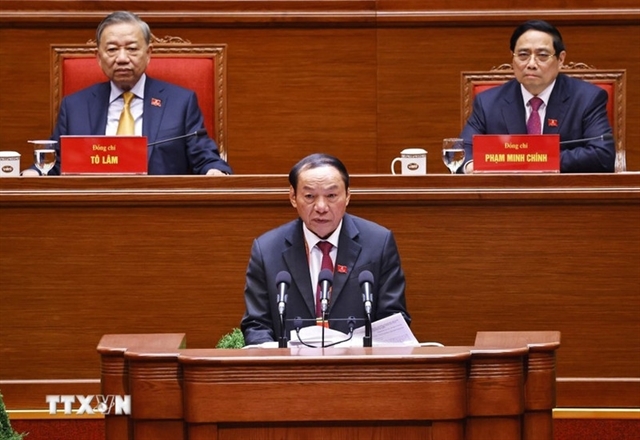 Opinion
Opinion


|
| Former National Assembly Office Chairman and member of the Central Committee of the Communist Party of Việt Nam Vũ Mão. — VNA/VNS File Photo |
The parliament last week grilled Government leaders and ministers on a wide range of hot-button issues. Former National Assembly (NA) Office Chairman Vũ Mão speaks to Kinh tế & Đô thị (Economic and Urban Affairs) newspaper on the need for action after Q&A sessions.
The Q&A sessions last week have included frank exchanges between NA deputies and cabinet members. How do you rate the performances in these sessions, from the perspective of someone familiar with parliamentary activities?
Q&A sessions have been getting progressively more professional and effective. The lively discussions are a necessary part of parliamentary activities. The motto of ‘quick questions and concise answers’ coupled with back-and-forth arguments serves to highlight what each cabinet member has achieved in performing their duties.
However, the ultimate goal needs to be bringing to the table all the important and urgent issues that matter to the majority of people. In this regard, I felt the Q&A last week was all over the place.
The four major topics – from security and order issues, to problems in construction management and planning to the management of cultural activities – deserve the spotlight, but I could see that the public want more relevant topics to be covered in the Q&A sessions, for example, the controversies surrounding the recent power price hike that affected many people.
Even though the topics were well-chosen, there should have been better orientations to guide the discussions towards addressing the root causes of each urgent issue. Each minister should be grilled on two or three existing problems that fall within their jurisdiction, but with more in-depth and to-the-point questions and answers. What’s the point of asking cabinet members so many questions, only to receive short and shallow responses?
The fact that there were 230 questions from NA deputies regarding the four Q&A topics shows that there are still many unresolved issues. What do you think?
It’s not strange to see so many issues put in front of the NA, but of course, we can’t discount the fact that ministries and government agencies have not been doing their job properly.
The controversies surrounding the toll roads for example have been raised so many times at the NA, with similar questions, but the ‘core issue’ remains elusive. There’s no denying the benefits of the Build-Operate-Transfer (BOT) model in Việt Nam’s traffic infrastructure development, but the loopholes and flaws in our legal framework have made it problematic and so poorly received by the general public. The key point to address this problem is to have a frank look at the weaknesses in our management and legislation.
Or regarding the cultural scene, as the country opens up, pursues a market economy and integrates with the international community, external influences will surely pour in and cause changes to Vietnamese life and culture, but the impacts are poorly researched and how to guard against negative influences remains an open question. This ultimately is the responsibility of the Ministry of Culture, Sports and Tourism. The ministry alone can’t handle everything but it should organise studies and propose measures to the Government and the National Assembly to address the underlying issues, instead of just fussing about the myriad incidents on the “surface.”
If the Q&A session is a benchmark of the performance of the ministers in dealing with hot-button issues, how do you rate the answers given?
Questions are necessary for the ministers and the chiefs of each sector to realise what issues are garnering public attention, and then to handle the problems accordingly. In this session, I think cabinet members have been trying to listen earnestly to the concerns and expressing a desire to be truthful, to uncover the underlying issues.
Still, I think that ministries and agencies should focus on unresolved issues – finding out whether the bottlenecks are due to the lacklustre implementation at the local level, or due to weak leadership, or due to some legal difficulties.
Frank answers and genuine wishes for improvement aside, what the voters expect from cabinet members are real actions that deliver real changes as they promised. Do you agree?
The workload awaiting our cabinet members is tremendous.
Like all constituents, I hope that under the leadership of the Prime Minister, ministers and cabinet members wouldn’t just think now that the question is in the rear-view mirror, “it’s finally over.” No, what follows questions and answers needs to be real action. The promises the ministers make in the parliament hall need to be converted into real results.
For example, superstition is rampant and manifested in so many forms, but we haven’t had solid preventive measures nor a penalty regime strong enough to deter future violations. The culture minister has again promised to come up with stringent measures to prevent crimes and fraud committed under the guise of religion and beliefs. Whether this pledge has “legs” still remains to be seen.
From the National Assembly, I think the effectiveness of the question session should be measured by ‘deliverables,’ namely the solutions for items listed in the National Assembly resolutions, the demands that the Government leaders and agencies need to carry out.
After the NA Resolution on the question session is issued, the NA needs to assign which committee will monitor which pledges made by which minister, so that next time when the minister takes the stage to field questions from deputies, they will have to be personally responsible for what they have achieved and where they have failed.
And of course, we also need to institute some sort of discipline or penalty for those failing to follow through on their promises. — VNS




